Uncertainty and concern are the most common words used in the private sector when discussion drifts towards the next year. The reasons for this state of unrest are the fact that the Fiscal Code has been ‘misplaced’ somewhere on the road (even if the Ministry of Finance’s debate on it with companies and tax experts has been a tortuous one) and that there is no national budget for the next year, at least not publicly. The danger of an increase in major taxes, of the introduction of a progressive tax policy, mentioned in several documents by the present government, or of the suggestion of new taxes are all possible alternatives, though none is desirable. The Fiscal Code on which the next year’s budget (revenues) is built could be passed at the end of this year or even at the beginning of 2015, through government decree.
Under the circumstances, it is clear that that text debated and rewritten with the business environment cannot be fully enforced. The decree can introduce but a part of changes, whose selection will be the government’s choice, depending on how expenditures will dictate. And the pressure is mounting. Reducing the deficit to 1,4% of the GDP, lowering the health insurance tax, increasing defense, co-finance and, recently, social expenses will create a need for 15-20 billion lei. Such a sum cannot be raised otherwise than making big changes in taxation.
The current Fiscal Code project stipulates an incredible increase of taxes on non-residential buildings that natural persons own, further taxation for land and cars and the reintroduction of the lump sum tax, specifically renamed. ‘The increase of taxes on agricultural land is huge. From 20 lei to 120 lei/ha means the equivalent of around 200 kg of wheat, which means that farmers should pay 6-7% of the yield’s value only to cover land taxation,’ says the president of the Fiscal Council, Ionuț Dumitru. In addition, the excise duties for 2015 are yet to be made public, with officials from the Ministry of Finance considering the possibility that they be in lei, instead of Euros. According to sources, the excise duties could be maintained at their current value in lei, a value higher than if the taxes would be converted in lei at the official EU exchange rate.
To renounce the flat tax policy is another scenario. The government’s programme and the fiscal and budgetary strategies stipulate that the introduction of the progressive tax for natural persons is an objective to be fulfilled by 2016.
The business environment strongly believes that increasing taxation will hinder economic growth and that the solution to respecting extra expense commitments should be fighting tax evasion and improving tax collection. After the increase in taxation in the last two years, the companies’ investments have been severely affected. ‘Last year’s attempts at increasing budget revenues through the introduction of the excise duties for petrol and gas oil and of the tax on special constructions have made the economy enter technical recession. In addition, hopes for economic growth in 2015 have also dwindled in the last months, which will add supplementary pressure on budget revenues,’ says Laurian Lungu.
Dan Bădin’s opinion is that there are two solutions for increasing budget revenues: increasing fees in the case of natural resources and the introduction of a specific tax, but the most efficient would be fighting tax evasion. ‘The business environment encourages measures to fight tax evasion, enhance collecting rates and support voluntary compliance,’ maintains Daniel Anghel. Predictability, which is a requirement companies have demanded, has been destroyed.
Without a Fiscal Code and a budget, which would form the complete expression of the fiscal and budgetary policies, firms cannot establish their own budgets which include, among others, investment plans and salary costs. If taxation increases, changes will be felt in the firms’ expenditures and could even lead to stopping some projects, reducing costs or even laying people off. ‘What sort of budget can a company make for next year, if it does not know what the major taxes will look like?’ is the rhetorical question Ionuţ Dumitru asks.
In spite of the pessimism of the business environment, the minister of finance, Ioana Petrescu, is convinced that she has stimulated business through her measures, although she systematically avoids answering any questions regarding next year. The only hint PM Victor Ponta has cared to disclose: the 2015 budget will be the responsibility of the future government.
History has shown that when we had significant budgetary losses to cover, the first thing that our politicians have thought about was increase taxation. This is extremely discouraging.
Ionuţ Dumitru, the Fiscal Council’s president
The introduction of new taxes and fees is not something we want to see in 2015 if Romania is to hold its commitments with regard to the structural deficit targets.
Daniel Anghel, Tax Partner, PwC
We’re afraid that the budget problems originating from the decrease of the health insurance tax will only inevitably cause an increase in taxation in 2015.
Mihai Bogza, president of the Foreign Investors’ Council
We have seen that the main issue of the business environment is that taxes are too high. Let’s not fool ourselves, the European context will only make taxes higher.
Valentin Lazea, chief-economist of the National Bank of Romania
The objective which all governments in the last 25 years (with no exception!) have paraded – of reducing tax evasion – should be translated into reality, after all this time.
Gabriel Sincu, Tax Director, E&Y
I hope we will not see an increase in taxation and that this too easy solution for any government will be replaced with better tax collection.
Marius Ionescu, NNDKP Partner on Fiscal Consulting
The fiscal uncertainty of 2015 is a serious impediment to the process of budgetary planning of the private sector.
Laurian Lungu, economic analyst
The main unknown elements are the real budget revenues and public money expenses, which depend on a variety of factors, such as the evolution of the economy and of the exports or the decisions about economic and budgetary policies.
Dan Bădin, Deloitte partner







